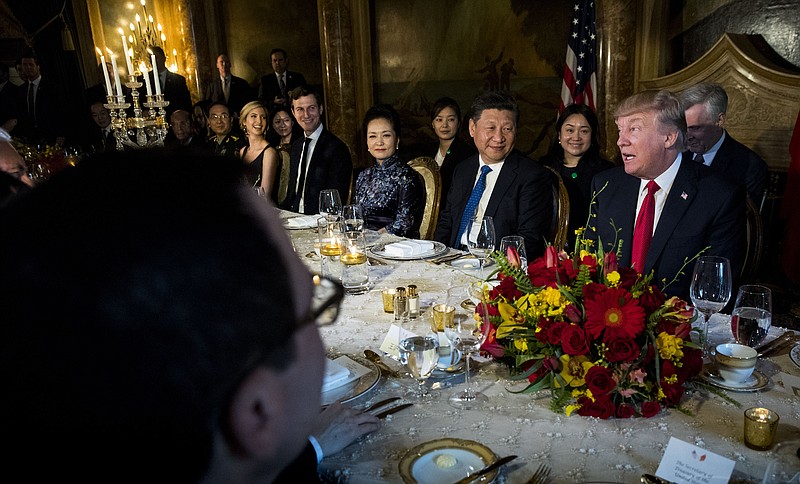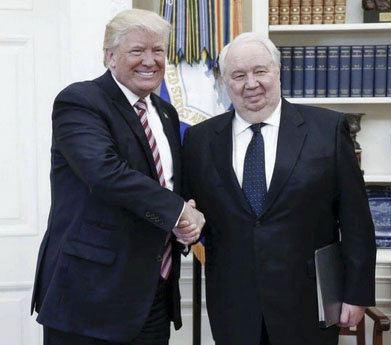Nearly 200 Democratic members of Congress sued President Donald Trump last week over foreign money flowing into his global business empire.
The lawsuit is monumentally important, though it got little attention given the rest of last week's news: a gunman's attack on Republican congressmen practicing for a charity baseball game and the revelation that the president himself is, in fact, under investigation for obstruction of justice.
But this lawsuit (and two more like it) is aimed at money, profits, possible favors and motivation - the heart of all things that trouble the Trump presidency. The suit brought by Congress members alleges that Trump is violating the emoluments clause of the Constitution, which states: "No Person holding any Office of Profit or Trust under them [the United States], shall, without the Consent of the Congress, accept of any present, Emolument, Office, or Title, of any kind whatever, from any King, Prince, or foreign State."
When foreign leaders and their contingents come to Washington and book rooms in the new Trump International Hotel on Pennsylvania Avenue just blocks from the White House, (or buy memberships and visit Mar-a-lago, the "Winter White House," or visit and play golf at Trump's Bedminster Golf Club) the president and his family profit, blurring the lines between what's good for the country and what's good for the Trumps.
The president doesn't make potential conflicts-of-interest and quid-pro-quo appearances any neater for himself when he says things like: "I'm a dealmaker," and "If he [Putin] says great things about me, I'm going to say great things about him."
To make matters more complicated, never in U.S. history has the prospect of a president's real and potential business dealings created such a feast of possible conflicts. Trump has real estate and other businesses all over the world.
The lawsuit's 37-page complaint notes that the Founding Fathers were concerned that foreign powers could interfere with American affairs with gifts, "benefits and rewards to the nation's chief executive to subvert his loyalty."
The suit states "these benefits include any compensation for services rendered in a private capacity such as when a foreign government throws a party at a hotel owned by a federal official."
Earlier last week, two Democratic attorneys general, one in Washington, D.C., and another in Maryland, filed a similar claim. And just days after Trump's inauguration in January, a liberal-funded government watchdog group, Citizens for Responsibility and Ethics in Washington, filed an emoluments lawsuit. A restaurant group and two individuals in the hotel industry later joined the CREW action as co-plaintiffs.
Trump and the Justice Department have called these lawsuits baseless. They argue the clause isn't intended to prevent normal business such as hotel payments and real estate transactions, according to The Associated Press.
But the Trump Organization acknowledged to news organizations that it has not been tracking all possible payments it receives from foreign governments, despite President Trump's promise to donate all profits earned from foreign governments to the U.S. Treasury in an effort to avoid conflicts of interest.
Trump turned over control of his real estate development, management and marketing company to his adult sons and a senior executive, but he did not divest from it. That means he still stands to benefit financially from the Trump Organization's profits, including from foreign governments.
Also, since Trump became president, the Trump Organization has secured dozens of potentially valuable patents, including in China, and collected fees from lobbyists working for Saudi Arabia and other countries using his properties.
The newest lawsuit states that the full scope of foreign payments to the Trump Organization cannot be known because the president has not made his tax returns public.
Sen. Richard Blumenthal, a Connecticut Democrat who helped organize the lawsuit, said the action has drawn more congressional plaintiffs than any legal action previously taken against a president. As of Wednesday, 196 Democrats had joined, but no Republicans.
Rep. John Conyers, a Michigan Democrat who helped, told The Washington Post that the congressmen are taking the action "not out of any sense of pleasure or partisanship but because President Trump has left us with no other option."
The suit notes that Congress has special standing because the Constitution's "foreign emoluments clause" requires the president to obtain the consent of Congress before accepting any gifts.
"The framers gave Congress a unique role, a unique right and responsibility," Blumenthal said.
The framers also gave presidents a strong mandate: Be the president, not the king. And make it transparently clear that you do not profiteer over this country's interests.
Perhaps Trump's insistence that there's nothing to see here is correct, yet no one in Trumpworld is showing us that, and the Trump track record for "believe me" is not reassuring.
Perhaps this newest lawsuit will help bring answers.

